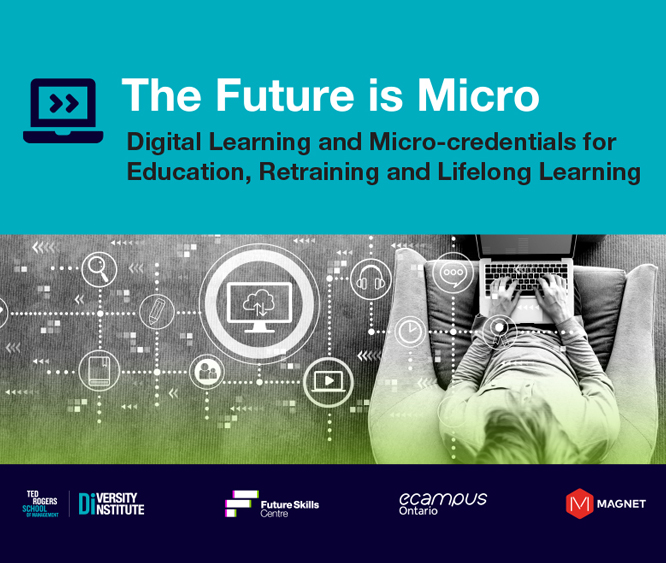
Why Micro-credentials Matter
In a world where continuous learning is essential, micro-credentials help learners develop the most relevant and in-demand skills and competencies through fast, accessible and affordable education.
They help organizations seeking critical skillsets train current and future employees. And they help educators and institutions support more diverse learners.
eCampusOntario Launches Micro-credential Toolkit
eCampusOntario’s Micro-credential Toolkit aims to help institutions, industry and communities build capacity for micro-credential development, enable learner-focused programming and support reskilling and flexible lifelong learning.
Read the toolkit to learn how to initiate micro-credential programming at your institution!
What is a micro-credential?
A micro-credential is a certification of assessed learning associated with a specific and relevant skill or competency. Micro-credentials enable rapid retraining and augment traditional education through pathways into regular postsecondary programming.
eCampusOntario is a provincial leader in the micro-credential landscape, with proven successes with initiatives at more than half of the colleges and universities in Ontario that utilize our Framework for ensuring workforce relevance.
How does it work?
eCampusOntario will use the information provided to match you with potential partners to develop education and training. Organizations and educational institutions will be connected to start partnership conversations based on the areas they wish to address, the type of support required, geographic and audience considerations.
Interested in getting involved?
Framework

Issuing Body
Micro-credentials will be issued by an established agency, organization, institution, or employer.

Summative Assessment
Micro-credentials will require evidence of achievement of outcomes. Evidence will be embedded and visible to employers.

Competency/Skills targeted
Micro-credentials will adhere to harmonized skills and competency language and will be aligned with a common competency framework such as ESCO1.

Transcriptable
Micro-credentials will be compatible with traditional transcripts, where possible.

Outcomes
Micro-credentials will recognize performance competencies explicitly aligned to underlying knowledge, attitudes and skills.

Partner Endorsement
Micro-credentials will be validated by industry partners/external bodies, where possible. This validation will confirm 1) the competency is in demand by industry and; 2) the established assessment is reflective of job performance in that industry.
The eCampusOntario micro-credential framework guides educators, employers and policy makers in the development of new micro-credential initiatives. Co-developed by representatives from postsecondary institutions and workforce partners, this proven framework provides a common standard on which to collaborate and create micro-credential programming that fills an identified skills gap.
The Framework is a living document. Partner organizations and institutions are encouraged to test this framework in their contexts and share their findings publicly to enable the development of a healthy micro-credential ecosystem that serves all Ontarians.
eCampusOntario supports and encourages the adoption of the framework for new and existing micro-credential initiatives both in Ontario and beyond our borders.
News

New Micro-credential Toolkit enables pathways for lifelong learning
This June, eCampusOntario announced the publication of its Micro-credential Toolkit, a how-to guide to help institutions develop micro-credential programs that meet the needs of learners and fill the skill gaps in the current and future labour market.
The toolkit is a frame of reference that covers topics such as the seven phases of the micro-credential lifecycle, tools to support employer-educator partnerships, how to involve learners as co-creators, and pathways for integrating micro-credentials into academic programming.

Ontario Invests in New and Expanded Rapid Training Programs
The Ontario government is providing $15 million to accelerate the development of rapid training programs and help people retrain and upgrade their skills to succeed in their current careers or find new employment. In partnership with industry, employers and other organizations, the province is inviting postsecondary institutions to design more micro-credentials that will prepare Ontarians for the in-demand jobs of today and tomorrow.

eCampusOntario to collaborate with partners on Ontario’s Micro-credential Strategy
eCampusOntario joins colleagues from across the Ontario postsecondary education sector in congratulating the Government of Ontario on the release of Budget 2020: Ontario’s Action Plan: Protect – Support – Recover.
Pilots
With the support of the Government of Ontario, eCampusOntario has launched thirty-six micro-credential pilot projects at Ontario colleges and universities. Each pilot project represents a unique partnership with an industry partner and a collaborative response to an identified skills gap. Download this document for a full list of pilots.
Whatever the conditions, eCampusOntario is your partner in driving the evolution of education through micro-credentials at both the local and systemic level. Upgrading learning through micro-credentials offers digital and creative solutions to meet rapid needs while building longer-term economic resilience.
Publications

Micro-credential Toolkit
eCampusOntario’s Micro-credential Toolkit builds upon the Micro-credential Principles and Framework and offers a how-to guide for developing micro-credential programs in Ontario. We surveyed our member institutions and stakeholders on the need for a toolkit and captured their expectations, knowledge gaps, and limitations. The toolkit offers practical knowledge, real-world examples and resources about micro-credentials from practitioners developing programs at postsecondary institutions across the province and country.

The Future is Micro: Digital Learning and Micro-credentials for Education, Retraining and Lifelong Learning
Over the last three years, eCampusOntario has worked with a variety of partners to develop micro-credential initiatives at Ontario PSIs through a series of pilot projects. This report, which is part of a larger collaboration between eCampusOntario, the Diversity Institute, Magnet, and the Future Skills Centre, focuses on these pilot projects to illuminate what is working, what is missing, and where we might be going when it comes to micro-credentials in Canada.

Open Competency Toolkit
The Open Competency Toolkit supports the development of micro-credentials in alignment with the eCampusOntario Micro-credential Principles and Framework. This toolkit provides context, templates and examples of open competency frameworks to be used in establishing a common language and understanding of competencies across PSE and industry.

Is the Future Micro? Unbundling Learning for Flexibility and Access
Is the Future Micro? is a collaboration to advance understanding of micro-credentials in support of economic recovery and lifelong learning. eCampusOntario is working with the Diversity Institute and Magnet at Ryerson University to conduct research on micro-credentials and their implications for learners, postsecondary education (PSE), industry receptivity, and labour market preparation and mobility.


eCampusOntario is a not-for-profit centre of excellence and global leader in the evolution of teaching and learning through technology.
